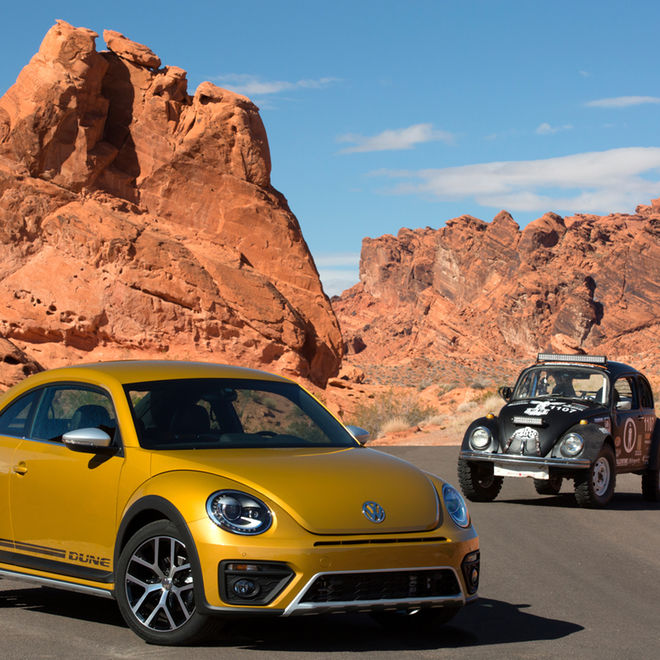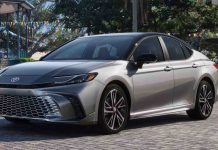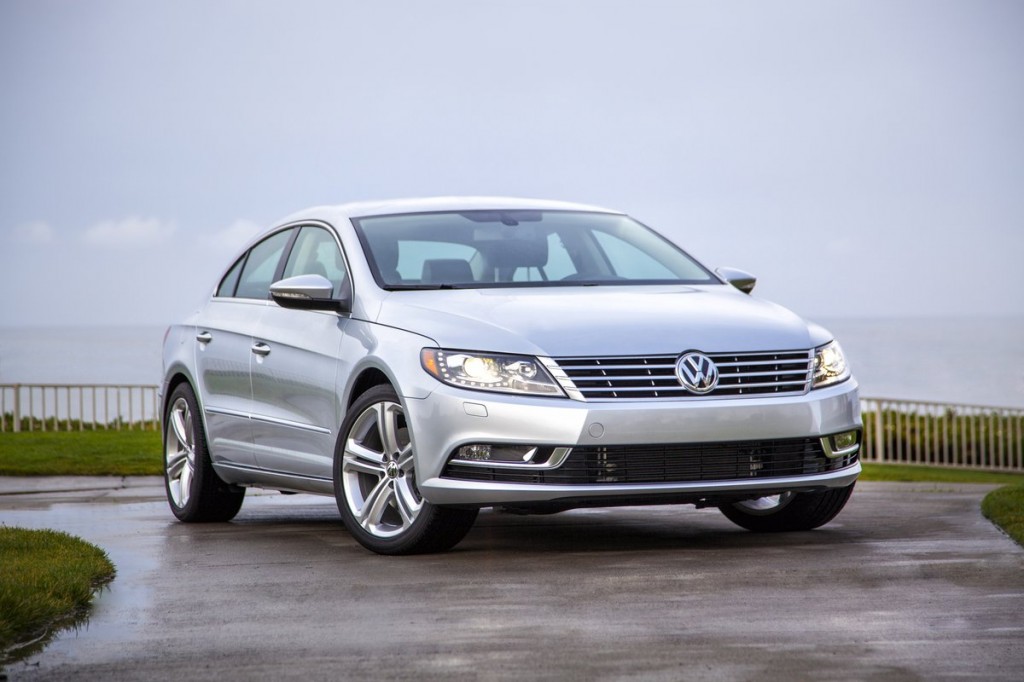Beetles – the original ones – were great in the snow.
This was decades before all-wheel-drive cars became common, when most cars were still rear-drive (and not great in the snow).
The original Beetle was also rear-wheel-drive, of course – but it had something else the others didn’t: The weight of its engine over the rear wheels.
And really skinny (tall and thin) wheels they were.
Like pizza cutters, they were ideal for cutting right through the snow (instead of riding on top of it) down to the pavement – and traction.
Beetles were also lots of fun in the sand, for similar reasons.
You may remember.
People used to strip them down – and jack them up. Then take the resultant dune buggy (or Baja) Beetle to the beach.
VW is hoping to conjure some of those good memories via the 2017 Beetle Dune.
It’s not exactly stripped down – but it is jacked up (a little) and features some unique retro styling touches like vestigial running boards, hunkier-than-standard-Beetle fender flares and unique paint options such as Sandstorm Yellow.
It might also be a hint of things to come.
VW may offer Alltrack all-wheel-drive as a Beetle option next year. It’s already been announced that Alltrack will be available optionally in the 2017 Golf.
And – to paraphrase Don Vincenzo from the movie True Romance – the Beetle is a Golf … under its skin, at least.
And an AWD-equipped Beetle Dune would make for a great Dune Beetle.
Or a snow Beetle.
Here’s to hoping.
WHAT IT IS
The Beetle Dune is a special edition iteration of the Beetle.
Though it is (for now) mainly an appearance package, it’s also more than just looks.
The Beetle Dune rides higher than the standard model (5.9 inches of ground clearance vs. 5.6 for the regular model) and has underbody skid plates and a slightly wider (.06 inch wider) track.
It also has a set of 18-inch wheels (16s are standard with other Beetles) and fatty 235/45-series tires. These look sharp but probably run counter to the car’s theoretical Dune-fording capabilities.
This version of the Beetle is also – unfortunately – automatic-only.
And it comes only with the 1.8 liter engine (a stronger, 2.0 liter engine is available in other Beetles, along with a six-speed manual transmission).
However, you can get it in either coupe or (just now) convertible form.
Base price for the Beetle Dune coupe is $23,995 – vs. $19,795 for the base (S trim) Beetle.
Official pricing for the convertible wasn’t available when this review was written in late June, but should be just under $28k (vs. $25,490 for a regular-edition Beetle convertible).
These should be arriving at dealerships any day now.
WHAT’S NEW
The convertible Beetle Dune is new, following up the debut earlier this year of the Beetle Dune coupe.
All the new Beetles (not just the Dunes) get an updated LCD touchscreen and suite of apps, including VW’s Car-Net App Connect smartphone system.
Extra ground clearance should help a little in the snow.
Turbocharged engine is designed to run on regular unleaded.
Upsized (back in 2012) Beetle has a roomier interior than potential still-small rivals like the Fiat 500 and the Mini Cooper.
More comfortable than Mini Cooper and Fiat 500.
WHAT’S NOT SO GOOD
Dune comes only with the automatic – and you can’t get it with the stronger 2.0 liter engine.
Or the 40 MPG-capable TDI diesel engine (thanks, Uncle).
Not as agile as the Mini or the 500.
Those fatty 18×8 wheels/tires are probably not going to be much help in the snow.
UNDER THE HOOD
The Beetle used to be available with your pick of three engines and either of two transmissions. Uncle killed off the diesel. VW decided for its own inscrutable reasons to limit the Beetle Dune – whether you go with the hardtop or the soft-top – to the base 1.8 liter gas engine, paired with the six-speed automatic.
Other Beetles can be ordered with a stronger 2.0 liter engine – and a more fun manual transmission (a five speed with the 1.8 engine and a six-speed with the 2.0 engine).
There’s nothing wrong with the 1.8 engine – or the six-speed automatic. It’s just hard to figure why the Dune should be restricted to that combo only when other combos are available.
The 1.8 makes 170 hp and 184 ft.-lbs. of torque at a launch-friendly 1,500 RPM. Paired with the mandatory six-speed automatic, it’ll get you to 60 in about 7.4 seconds if you buy the hardtop and 7.5 for the convertible which – let the record show – is only about 132 pounds heavier than the hardtop coupe (3,225 lbs. and 3,093 lbs., respectively).
Kudos to VW for keeping the convertible’s weight down.
Fuel efficiency is 25 city, 34 highway with either bodystyle – although nowhere near as good as what the force-retired diesel Beetle was capable of (30 city, 40 highway).
The 1.8 liter engine is a regular fuel engine.
More kudos, VW.
Many turbo engines require premium fuel to deliver other advertised hp and mileage promises. This includes the Mini Cooper’s standard 1.5 liter turbo engine and also the Fiat 500’s not-turbocharged 1.4 liter engine (which merely “recommends” premium unleaded). The little Fiat does hit 40 on the highway, though – matching the mileage delivered by the diesel Beetle.
Well, used to be delivered.
A tantalizing prospect is the possibility that VW will offer an all-wheel-drive Dune Beetle in 2017. The word is already out that the 2017 Golf – which is the Beetle’s progenitor – will offer it.
Why not the Beetle?
Especially the Beetle Dune.
Equipped with Alltrack (VW’s name for tis AWD system) the Beetle – Dune or otherwise – would be capable of tackling sand instead of just looking like it could.
And it’d be much better in the snow, too.
Maybe even as good as a classic Beetle.
Fingers crossed, we’ll see.
ON THE ROAD
I’ve owned several original Beetles (also a Thing – which is a Beetle that looks like a Jeep, kinda-sorta) and these new Beetles are nothing like them, functionally.
Which is both good … and also a little sad.
On the good:
The new Beetle, its looks notwithstanding, is a modern car with a water-cooled, fuel-injected engine that starts immediately, never stalls or bucks.
It has heat that works and defrosters that do, too.
In my ’73 Super Beetle, I kept a rag handy at all times to wipe down the inside glass – so I could see (kind of) what was going on outside when it was raining and the inside of the Beetle had steamed up like a Turkish bath due to the leaky bodywork and absence of air conditioning to dehumidify the cabin.
You did have wing vent windows, which was good because it helped you avoid being put to sleep (permanently) by the carbon monoxide brought into the interior via the leaky ductwork for the “heater” (air quotes for irony).
You kept gloves in the glovebox in the winter – unless you liked frostbite on your fingers.
In summer, meanwhile, it was fetid. Until you got better ventilation from the rust holes in the floorboards.
But, primitive as it was, the old Beetles had character. It was a happy little car that made you smile precisely because it was so… primitive. Every trip was an adventure.
They had a lawn mower-like air-cooled engine. It ticked and whirred in a very distinctive way. Even today, you know a classic Beetle by its sound, without even looking.
No radiator, no hoses. Just the one fan belt. Three quarts of oil, give or take – and a screen you cleaned.
You’d usually make it … eventually. But there were often unplanned pit stops.
The throttle cable would snap or the single barrel Solex carburetor would backfire, sometimes catching fire.
You might sputter to a stop by the side of the road.
But – if you were the least bit handy and had a few very basic tools, most especially the now-iconic repair manual for the Compleat Idiot – it was almost always possible to get back on the road again… eventually.
Indigent hippies loved the Beetle for a reason.
Also college kids and people who just wanted a basic car. Something almost anyone could fix, that needed very little money to acquire or keep running.
Uncle won’t allow it.
Just as Uncle has made it almost impossible to sell a diesel engine anymore, he made it impossible to sell interesting (such as air-cooled) engines. Their operating temperature range is broader (and they run hotter) and also harder to control and because of this, their emissions tend to be higher. VW gave up on air-cooled engines in the late ‘70s (well, in the U.S. – VW continued to make them right through the early 2000s in Mexico).
Which is why the ’16 Beetle’s 1.8 liter engine is a modern engine. Thoroughly homogenized. Nothing particularly distinctive about, whether the measure is its layout/design or the way it sounds/feels/reacts. For the same reason that modern cars look more and more alike, their engines are also more and more alike. They have to be.
VW’s hands are tied. They’d never have got away with putting an air-cooled flat four in a 2017 (or even a 2007) Beetle. But they could have put a manual transmission in it. Uncle hasn’t outlawed that, yet. And you can get one in other Beetle models.
But not the Beetle Dune.
I can’t disparage the function of the mandatory (with this Beetle) six-speed automatic, which works well with the 1.8 liter’s turbo-enhanced torque – which (per above) peaks at just 1,500 RPM, so the car moves out smartly without having to floor it and wait for it to build power.
And there is power – something no classic Beetle ever had.
This one can reach higher speeds in 10 seconds than a classic Beetle could reach, period.
But the five-speed manual you can get in other Beetles would make this car a lot more fun.
Some interesting stuff: Though it is has grown to almost mid-sized dimensions – and is a much larger car on the outside than the Mini Cooper – it has the same turning circle (35.4 feet). That makes the VW tight-spot (and cul-de-sac) friendly but its larger size and about 300 pounds of additional curb weight vs. the Mini gives it a more substantial feel out on the road. Especially on the highway – where it’s less susceptible to being buffeted off the highway and into the ditch by the slipstream of a passing big rig.
It’s not as agile as either the Mini or the Fiat 500.
But it’s much more comfortable.
Unlike my ’73, the cabin is quiet and leak-free. This includes the convertible – the only downside here being the poor visibility to the rear and sides when the top’s up – and a severely truncated trunk (7.1 cubes).
The VW’s fuel tank is significantly larger than its two main rivals: 14.5 gallons vs. 11.6 for the Mini Cooper and 10.5 gallons for the Fiat 500. This gives the VW longer legs (493 miles on the highway) than either of them, which is another form of comfort. It’s nice to not have to stop for fuel as often.
The Dune’s additional ground clearance should help a little in the winter, too.
All-wheel-drive would help a lot.
It’s no accident that VW put “Dune” after “Beetle.”
In the ‘70s, it was the reverse. Dune Beetle (or Baja Bug). It probably still had some of its body panels – but the fenders and engine cover (out back, remember) were usually removed. This was easy to do because most of the classic Beetle’s body panels bolted on – and so could be unbolted with hand tools.
The fenders got nixed in order to make room for knobby-type tires (and to give all that sand being chucked around someplace to go). The engine was exposed for the coolness of it – and also to make room for the “zoomie” exhaust header and pipe that was a dune Bug hallmark.
The Beetle Dune has all its panels – which would be hard to remove without a torch.
Some of them are different than standard Beetle panels. The side panels, for example, get vestigial running boards meant to conjure memories of the original Beetle’s real ones (which you could actually step/stand on). The Beetle Dune also has a different front clip with an integrated skid plate and there are wheel arch extensions meant to convey a more rugged look.
The standard 16-inch wheels are nixed in favor of a set that’s two sizes larger: 18x8s shoed with 235/45-series all-season tires.
An optionally available Lighting package adds LED daytime running lights (DRLs) and LED license plate lighting plus Xenon HID headlights.
Special paint colors and “Dune” decals provide the finishing touch on the outside. Inside, there are trim panels painted the body color and special seating material set off with contrast-color orange stitching.
There are also several classic Beetle-inspired touches, such as the upper glovebox (there’s a second, standard-sized one below it) and expandable waistband-style beverage (or whatever) strap holders on each door. The upside to these is they really hold your beverage, so it doesn’t slosh and spill. The downside is the strap tension is strong enough to squeeze Starbucks’s-style cardboard paper cups and pop the lid off… spilling stuff all over. Use these for plastic water bottles and you’ll be fine.
The available Fender audio system is top drawer. The reception of the SiriusXM satellite radio is sometimes spotty. I live in the mountains, where I have found that cliff/tree overhang interferes with satellite radio reception regardless of the make/model of car the head unit is in. But some are worse than others – probably due to antenna design or the shape of the car or some other factor. The Beetle’s reception was a bit worse in the Dead Zones than the Nissan Titan XD I had the previous week (review here) and the Titan had a very cool feature that the VW doesn’t offer but ought to – a record/playback function. If you hit a dead zone (these can last several minutes in some areas) you can replay the part you just missed.
Every car with Sirius/XM should have this.
It sucks that Uncle has issued a fatwa against VW that prevents them from selling any TDI-powered cars for the foreseeable future. But it sucks even more than VW hasn’t defended itself against Uncle. Yes, the company “cheated” by installing software that enabled the cars to end-run Uncle’s emissions tests. But the emissions at issue are trivial – while the damage done not just to VW but to diesel-powered cars generally is catastrophic. VW might pick up sticks and leave the U.S. market altogether and even if they don’t, the negative PR has probably soured the public on diesels to such an extent that other manufacturers who were thinking about selling them here (Mazda being one) have already decided not to.
Again, thank Uncle.
THE BOTTOM LINE
This Beetle Dune is a neat package but it’d be even neater if it were cheaper and simpler – and maybe offered AWD.
Please remember, EPautos.com depends on you to keep the wheels turning! The control freaks (Clovers) hate us. Goo-guhl blackballed us.
Will you help us?
EPautos stickers – new design, larger and magnetic! – are free to those who send in $10 or more to support the site.
Our donate button is here.
If you prefer not to use PayPal, our mailing address is:
EPautos
721 Hummingbird Lane SE
Copper Hill, VA 24079



















Skid plate, bigger wheels/tires, slightly more ground clearance……that would have been a good start. Too bad that AWD and the big engine are not available. Makes the whole thing more of a “badge and tape” package.
An automatic transmission in the sand or snow? Puleeeze! The sand/beach/mountain is mucho more fun with a manual.
Man, I remember when VW beetles cost $1995. Now, it’s pretty much impossible to find a real beetle for less than $4k.
Owned more VW’s than I can remember… ’64 beetle, ’63 beetle, ’71 delivery van, ’70 fastback, and a ’69 squareback. That ’63 beetle brought my honey to Georgia from Arizona in 1972 for our marriage. It also traveled a good portion of the U.S. and took us to San Fran for deployment to SE Asia. My wife sold it to her sister and one week later it was stolen.
Great cars. Four bolts and you can drop the engine.
Ahhh, memories…
Ditto, Harry!
I really miss my ’73 Super Beetle and my ’74 Thing. Also had a ’69 Fastback at one point (Bosch EFI!)
Before I met her my wife had a Squareback (named Fred). I think occasionally about getting a ‘real’ Beetle. But if I did, it would have to be a 67 or older – w/o the Nader bumpers.
They were great in Tx. and didn’t rust out and in arid parts, rain was not common problem nor ice. You could freeze in one though. Probably the most ever to grace west and north Tx. were Meyer’s Manx(can’t believe no photo)dune buggy’s. We had a local place with some original molds who made bodies and completed Manx’s but no Meyer’s Manx logos since they weren’t paying Meyer anything. A friend stuck a Buick aluminum V-6 in one. It would haul ass.
Oh, man. I had a 1974 SB when I was in high school. In addition to the features you listed, it had a washer fluid reservoir pressurized by the spare tire (wtf?) and a suicidal master cylinder (pedal randomly went straight to the floor). I was just telling my son about having to carry a scraper for the inside of the windshield.
You are spot on about the snow, though. Nothing more fun than a rear-drive, rear-engined SB on a frozen lake! I probably learned more about driving from that car than any I’ve had since.
Oh, and the body parts were a breeze to swap out. No 5mph plastic bumpers on that thing! If it wasn’t for the horrendous rust problems, they would still be a perfect car for the young driver.
Great memories, Yeti!
I often miss my ’73… rust and all…
Scaper for the INSIDE of the windshield! I remember that, having a ’68 Type 1 my last year of college and first year of work. Great (but not fast) little car. WONDERFUL in snow. March of ’90 we had one of our typical spring blizzards in Denver. I was tooling home from work in the early AM, watching the snow and doing maybe 45 mph when I was passed at great speed on the freeway by a brand new 4×4 with temporary plates.
Half a mile later who do I see upside down in the median of the freeway?
Wish I still had that car…
You probably noticed many blizzards in the 89-90 winter. We did in Tx.